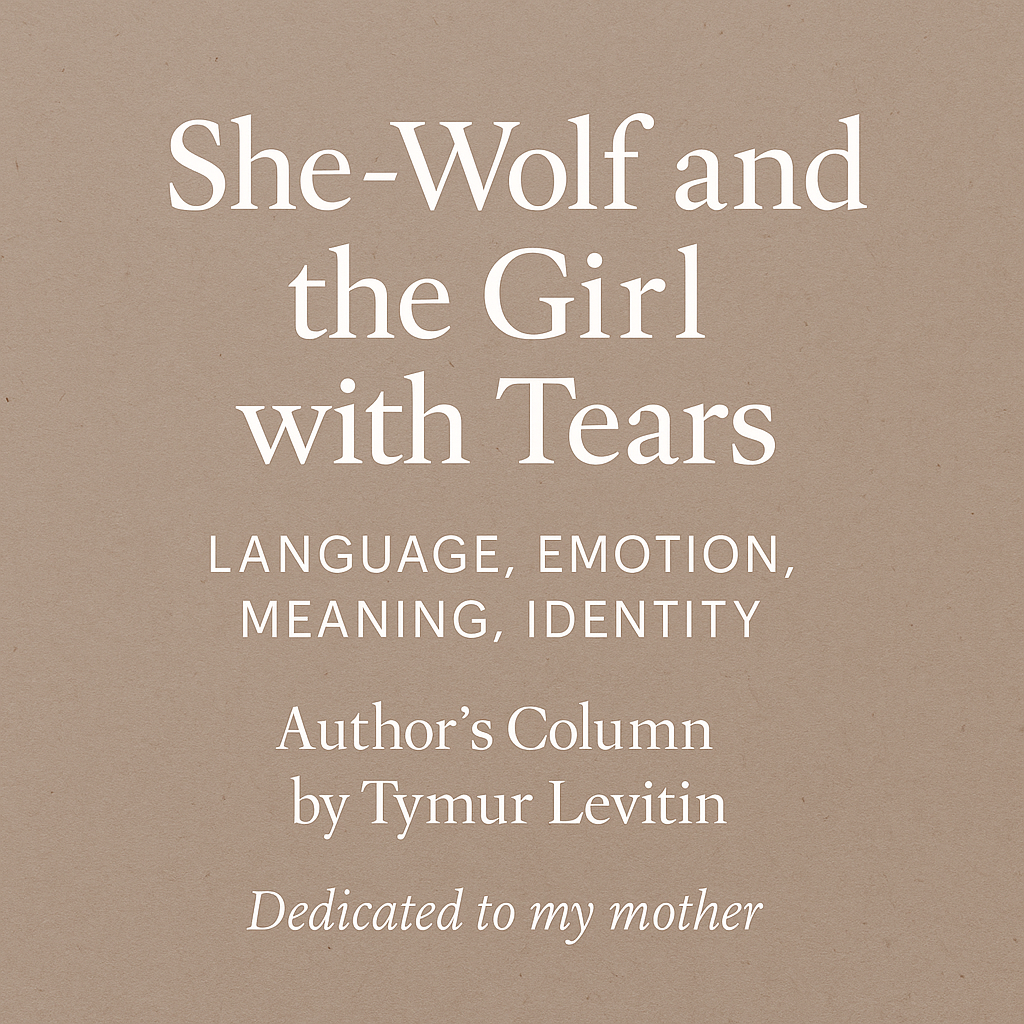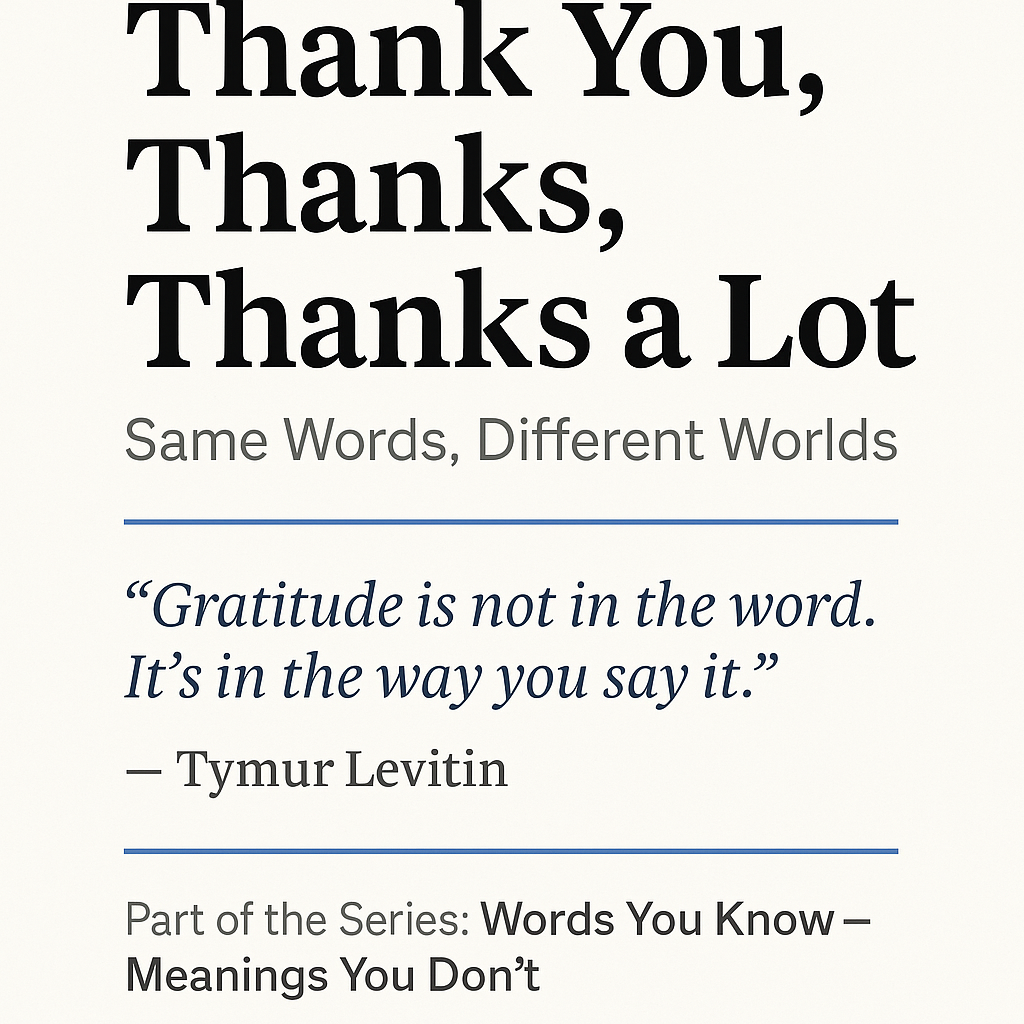Autorenkolumne von Tymur Levitin
Series: “Language. Identity. Choice. Meaning.”
🌐 Choose your language:
🔗 Read in Ukrainian / Читати українською
🔗 Read in Russian / Читать по-русски
📍 Introduction
This is not just a story about words.
It’s a story told by a grown man.
A teacher. A translator. A son.
And it started with a simple question from a student:
“What did he really mean when he called her a ‘she-wolf’?”
That’s where true translation begins — not with dictionaries,
but with understanding what was meant, not just said.
We’re not translating lyrics.
We’re translating the space between the lines.
🐺 The She-Wolf: a man’s voice about a grown woman
She’s just a lonely she-wolf,
Not every man can win her love.
She’s like a queen, untamed and free —
You can’t buy her, and you can’t break her.
This isn’t a boy singing.
Es ist ein man, speaking with silence, not control.
He doesn’t want to change her. He recognizes her.
She doesn’t beg. Doesn’t explain. Doesn’t play.
She just leaves — when she’s no longer seen.
And if you’ve ever met a woman like that,
you’ll never forget her.
🐱 The Cat: a young girl’s voice, talking to herself
What does she dream of
when tears fall on her lashes?
Another night without sleep…
and it hurts to smoke alone.
This is not a man’s voice.
This is a young girl, trying to understand her own sadness.
Still open, still hopeful, still raw.
Her pain is not yet shaped by silence.
She’s trying to speak it — with her whole body.
🔹 Note: In Russian, the original line is «Что ей снится…», nicht «О чём ей снится…».
“Что” is the idiomatic and poetic way to ask what she dreams — “о чём” would sound unnatural here.
🌍 Why it matters to language learners
Because language is not neutral.
A word in one language may carry respect, shame, tenderness, or pride in another.
And if you want to speak a language — truly speak it —
you must understand how it speaks you.
When a student says “she’s a she-wolf,”
does he mean she’s fierce? Untouchable? Mysterious? Sexual?
And if he says “my little cat,”
does he mean it playfully? Or is he crossing a line?
That’s why we don’t translate lyrics.
We translate the Emotionen behind them.
🎓 Translation comparison: “She-wolf” verse
When her ice melts before a heart that burns —
she’ll forget the pain of loneliness…
| Language | Translation | Kommentar |
|---|---|---|
| 🇬🇧 English | When her ice melts before a heart that burns… | Preserves “before” structure. Better than “from” or “because of.” |
| 🇩🇪 German | Wenn ihr Eis vor einem brennenden Herzen schmilzt… | “Vor” = before; elegant, literal, neutral tone. |
| 🇺🇦 Ukrainian | Коли її лід перед палаючим серцем розтане… | Strong, poetic, visually powerful. |
| 🇷🇺 Russian | Когда её лёд перед сердцем горячим растает… | Original line. Graceful and rhythmic. |
| 🇪🇸 Spanish | Cuando su hielo se derrita ante un corazón ardiente… | Emotional, rich. “Ante” is formal but effective. |
| 🇫🇷 French | Quand sa glace fondra devant un cœur brûlant… | Smooth, distant, poetic. |
| 🇯🇵 Japanese | 彼女の氷が燃える心の前で溶けた時、孤独の痛みを忘れるだろう | Deeply evocative, poetic, layered with cultural nuance. |
🎵 Translation comparison: “What does she dream of?” (Face2Face)
What does she dream of,
when tears fall on her lashes?
| Language | Translation | Kommentar |
|---|---|---|
| 🇬🇧 English | What does she dream of… | Clear, slightly soft. |
| 🇩🇪 German | Wovon träumt sie, wenn Tränen auf ihren Wimpern liegen? | Very precise, yet distant. |
| 🇺🇦 Ukrainian | Що їй сниться, коли сльози на її віях? | Lyrical, alive, musical. |
| 🇷🇺 Russian | Что ей снится, когда слёзы на ресницах? | Idiomatic, touching, tender. |
| 🇪🇸 Spanish | ¿Con qué sueña cuando las lágrimas caen sobre sus pestañas? | Passionate, flowing. |
| 🇫🇷 French | À quoi rêve-t-elle quand des larmes coulent sur ses cils ? | Soft and poetic. |
| 🇯🇵 Japanese | 彼女のまつげに涙がある時、彼女は何を夢見ているの? | Feels like haiku. Poetic restraint. |
🧭 The contrast: She-Wolf vs Cat
| Image | Voice | Generation | Position | Emotion |
|---|---|---|---|---|
| 🐺 She-Wolf | Man about woman | Maturity | “I respect her” | Strength, silence |
| 🐱 Cat | Girl about herself | Youth | “I want to be held” | Sadness, vulnerability |
💡 For language learners
- Words are never neutral.
- Literal translation may distort emotional tone.
- Grammar and syntax matter — but context matters more.
- Language is music. Meaning lives in rhythm and hesitation.
- Translation is not copying — it’s choosing.
🔗 Related articles:
💙 Dedication
🔹 This article is dedicated to my mother — Emma Yurievna Levitina.
A woman who never played roles,
never pretended, never asked for anything.
She did what she believed was right.
Always.
I don’t know if it made me better or worse —
but I am who I am.
Because she raised me that way.
And I wouldn’t be any other.

© Tymur Levitin. Alle Rechte vorbehalten.
Author’s Column by Tymur Levitin — founder, director and head teacher of Levitin Language School.























